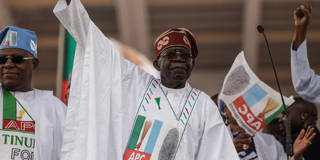Bola Tinubu, Nigeria's new leader, has enacted a raft of bold economic reforms in his first weeks in office. If he addresses the country’s security challenges, energy woes, and governance shortcomings, and secures the backing of investors and development partners, he could transform the continent’s largest economy.
WASHINGTON, DC – Shortly after taking office on May 29, Nigeria’s President Bola Tinubu surprised many observers by implementing a series of bold reforms. In addition to scrapping costly fuel subsidies and various taxes, he suspended the country’s central-bank governor, which led to the immediate removal of trading restrictions that propped up the value of the naira. And to curry favor with Nigeria’s huge population of young people, Tinubu introduced interest-free loans to help students fund higher education.

WASHINGTON, DC – Shortly after taking office on May 29, Nigeria’s President Bola Tinubu surprised many observers by implementing a series of bold reforms. In addition to scrapping costly fuel subsidies and various taxes, he suspended the country’s central-bank governor, which led to the immediate removal of trading restrictions that propped up the value of the naira. And to curry favor with Nigeria’s huge population of young people, Tinubu introduced interest-free loans to help students fund higher education.